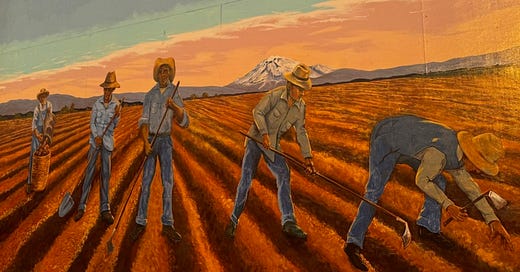After discovering a chronically ill pediatric patient canceled her appointment, my team and I had been trying to reach her adult brother, Miguel — the only family she has in the US — for days without success.
“Clearly, the health of the patient isn’t his priority! What a nightmare!” My medical student remarked.
My medical assistant, Cindy, looked very bothered by this comment. But she was too timid to say anything except: “Let me try a few more times! He’s probably working. A LOT.”
I work with the migrant worker community. From September to November, our patients go through the harvest season. And many produce are harvested at night. For some patients, working in the fields is their only source of income. They either work day and night or they starve.
Most medical assistants at my clinic come from the same community we serve. They’ve either worked in the fields themselves or they’ve watched their parents break their backs until ridiculously old age doing so.
So, Cindy gets it. She doesn’t just get it. She feels it. And she kept trying.
When she finally got through to Miguel, he was very apologetic. Indeed, he had been working day and night.
In Spanish, Miguel said: “I’m so sorry! I canceled so I could reschedule all my sister’s appointments on the same day. This way, I don’t have to miss work for more than one day.” Miguel told us he had been trying to catch up on sleep whenever he could and sometimes his phone was on silence. Indeed, missing one day of work might mean missing a whole week’s grocery money.
At age 19, Miguel is a child himself. But he takes care of his sick baby sister all by himself in a foreign country while working physically demanding jobs. Our patient is well-fed, well-dressed, goes to school, and has health insurance. She adores her big brother and it shows through their interactions.
When Miguel apologized repeatedly, we teared up. We wanted to hug him and tell him: “Kid, you have nothing to apologize for. You are not in trouble! Thank you for being the brother and the parent your sister needs. We hope you take care of yourself, too.”
The Cindys and the Miguels around me teach me important lessons every day. They keep me in check and prevent my privileges from infecting my compassion.
By wearing the white coat I am The Doctor. And by sitting on the exam table a person becomes The Patient. But that’s not all they are. Not even close.
The REAL identities of many migrant workers/immigrant families are:
parents who endure extreme danger and hardship to provide their children with a better life;
kids who have had to grow up way too fast;
families who can’t afford to be together;
ill-health sufferers who have to choose between keeping their livelihood and coming to the doctor’s.
Doctors went to school to study medicine, not morality. We might be qualified to make treatment plans, but never moral judgments. We can try to comprehend a diagnosis, but we will never fully understand the work people do, the families they live for, the way they love, or the songs their hearts sing.
So, no.
For many, not making it to the doctor’s appointment is not a nightmare.
It’s the reality.
And healthcare may not be people’s priority.
Living is.





Thank you for sharing Dr Zha! I wish more doctors had your insight and compassion. It’s so important not to make moral judgement of the patient and instead meet them where they’re at.
When you said, Cindy doesn't just get it, she feels it. That landed so deeply for me!